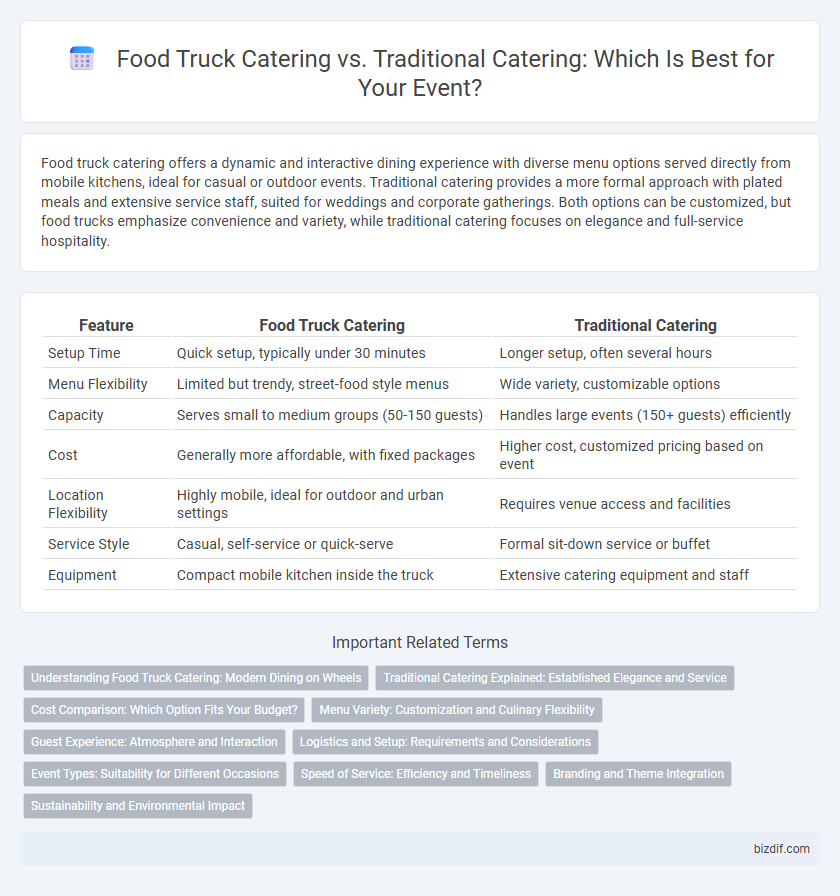Food truck catering offers a dynamic and interactive dining experience with diverse menu options served directly from mobile kitchens, ideal for casual or outdoor events. Traditional catering provides a more formal approach with plated meals and extensive service staff, suited for weddings and corporate gatherings. Both options can be customized, but food trucks emphasize convenience and variety, while traditional catering focuses on elegance and full-service hospitality.
Table of Comparison
| Feature | Food Truck Catering | Traditional Catering |
|---|---|---|
| Setup Time | Quick setup, typically under 30 minutes | Longer setup, often several hours |
| Menu Flexibility | Limited but trendy, street-food style menus | Wide variety, customizable options |
| Capacity | Serves small to medium groups (50-150 guests) | Handles large events (150+ guests) efficiently |
| Cost | Generally more affordable, with fixed packages | Higher cost, customized pricing based on event |
| Location Flexibility | Highly mobile, ideal for outdoor and urban settings | Requires venue access and facilities |
| Service Style | Casual, self-service or quick-serve | Formal sit-down service or buffet |
| Equipment | Compact mobile kitchen inside the truck | Extensive catering equipment and staff |
Understanding Food Truck Catering: Modern Dining on Wheels
Food truck catering offers a dynamic and customizable dining experience, bringing diverse cuisines directly to event locations, unlike traditional catering which relies on fixed venues or onsite setups. This mobile culinary service enhances guest interaction and provides fresh, made-to-order meals efficiently, making it ideal for casual or outdoor events. The growing trend reflects a shift in consumer preference towards innovative, convenient, and personalized food options at gatherings.
Traditional Catering Explained: Established Elegance and Service
Traditional catering offers established elegance through meticulously planned menus and professional service staff, ensuring a refined dining experience. This catering style is favored for formal events like weddings and corporate gatherings where presentation and personalized service are paramount. Unlike food truck catering, traditional catering provides extensive menu customization, table settings, and coordinated event logistics for seamless execution.
Cost Comparison: Which Option Fits Your Budget?
Food truck catering generally offers a more cost-effective solution, with lower overhead expenses and flexible menu options that fit a range of budgets. Traditional catering often involves higher costs due to venue fees, extensive staff requirements, and elaborate setups. Evaluating guest count, event location, and service style helps determine which option aligns best with your budget constraints.
Menu Variety: Customization and Culinary Flexibility
Food truck catering offers unparalleled menu variety with customizable options that adapt easily to diverse culinary preferences and dietary needs. Traditional catering provides structured menus but limits flexibility due to fixed kitchen environments and pre-set offerings. Food trucks leverage mobile kitchens to experiment with fusion dishes and on-the-spot adjustments, enhancing guest satisfaction through tailored culinary experiences.
Guest Experience: Atmosphere and Interaction
Food truck catering offers a casual and interactive experience, allowing guests to watch meals being prepared and customize their orders, which creates a lively atmosphere. Traditional catering typically provides a more formal setting with plated service, promoting structured social interactions and a refined ambiance. Both styles impact guest experience differently by balancing engagement and elegance according to event needs.
Logistics and Setup: Requirements and Considerations
Food truck catering offers streamlined logistics with minimal setup, often requiring only parking space, power access, and local permits, making it ideal for flexible, off-site events. Traditional catering demands extensive planning including kitchen prep areas, serving stations, and transportation of food and equipment, which can increase setup time and complexity. Venue accessibility and event scale play crucial roles in determining whether the mobile convenience of food trucks or the comprehensive service of traditional catering is more suitable.
Event Types: Suitability for Different Occasions
Food truck catering excels at informal events such as festivals, corporate picnics, and casual weddings due to its mobility and diverse menu options. Traditional catering suits formal occasions like gala dinners, conferences, and upscale weddings where plated meals and elegant presentation are paramount. Choosing between food truck catering and traditional catering depends on the event's atmosphere, guest expectations, and logistical requirements.
Speed of Service: Efficiency and Timeliness
Food truck catering offers rapid service by streamlining food preparation and minimizing wait times through mobile kitchen setups, making it ideal for events requiring swift turnaround. Traditional catering often involves complex setups and multiple service stations, which can lead to longer wait times despite providing a diverse menu. Efficiency in food truck catering enhances timeliness, while traditional catering prioritizes variety and presentation at the cost of slower service.
Branding and Theme Integration
Food truck catering offers unique opportunities for vibrant branding and seamless theme integration by turning each vehicle into a mobile advertisement that captures attention and reinforces brand identity at events. Traditional catering relies on table setups and staff uniforms to convey the theme, but often lacks the dynamic visual impact and street-level engagement that food trucks provide. Utilizing food trucks allows businesses to creatively align their menu design, vehicle graphics, and service style with the event's overall theme, enhancing guest experience and brand recall.
Sustainability and Environmental Impact
Food truck catering significantly reduces environmental impact by minimizing food waste through smaller, on-demand servings and utilizing energy-efficient cooking methods compared to traditional catering. Sustainable practices in food trucks often include sourcing local, organic ingredients and using biodegradable packaging, which lowers carbon footprints and landfill contributions. Traditional catering typically involves larger quantities and extensive transportation logistics, resulting in higher greenhouse gas emissions and resource consumption.
Food truck catering vs Traditional catering Infographic

 bizdif.com
bizdif.com